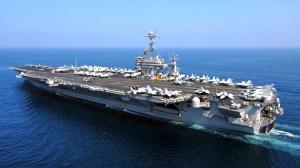 Iran’s army chief on Tuesday warned a nuclear-powered U.S. aircraft carrier not to return to the Persian ( or Arabian) Gulf, as Iran’s navy ended 10 days of tense war games in the Persian Gulf.
Iran’s army chief on Tuesday warned a nuclear-powered U.S. aircraft carrier not to return to the Persian ( or Arabian) Gulf, as Iran’s navy ended 10 days of tense war games in the Persian Gulf.
Gen. Ataollah Salehi, the commander of the Iranian armed forces, lauded Iran’s defensive skills and lashed out against the USS John C. Stennis and its battle group. The carrier and its accompanying ships left the strategic Persian Gulf last Thursday, their departure filmed by Iranian drones.
“We warn this ship, which is considered a threat to us, not to come back, and we do not repeat our words twice,” Salehi said, according to the Iranian Students’ News Agency.
The United States has pledged to ensure freedom of navigation through the Persian Gulf and the narrow Strait of Hormuz, through which about a third of the world’s crude oil shipments pass. The U.S. Navy maintains a base in Bahrain to support as many as three aircraft carriers and a fleet of support ships plying the shallow waters of the gulf.
Following Western threats to impose an embargo on Iranian oil, Iran threatened to close off the Persian Gulf during the war games but refrained from doing so. Officials have given contradictory statements on whether Iran would make such a move in the future.
Meanwhile, Iran’s central bank, which was placed under U.S. sanctions Saturday, intervened to flood the local market with dollars, helping the national currency to appreciate a bit following a steep slide. The currency, the rial, had slipped to unprecedented lows against the dollar after the U.S. move.
But Iranian officials stressed that their own economic policies — rather than the sanctions — were to blame for the rial’s loss of nearly 20 percent of its value in two days, the latest of several currency shocks in recent weeks.
“Sanctions have not created any obstacles for the country, and the enemy is only hoping for psychological tensions,” embattled central bank director Mahmoud Bahmani told the semiofficial Fars News Agency on Tuesday.
Experts said the government is awash in dollars from record oil revenues in the past five years but cannot change them into rials because no one in Iran has funds of that magnitude.
“The government needs around $1 billion a week to pay salaries and costs,” said one influential middleman who spoke on condition of anonymity. He said he was seeking domestic buyers for huge amounts of government dollars in order to get rials.
“But even the banks don’t have enough funds to buy them at a discount,” he said. The sanctions, he said, were the engines driving the wider public to start changing their money into foreign currencies.
A bold commentary Tuesday in the Shargh news paper, which is critical of the government, broke a taboo by openly warning Iranian officials of economic disaster and war in a front-page piece that painted a grim scenario for the coming months.
“The rial will devalue even more, and a chain reaction will take place if Europe sanctions Iranian oil,” wrote Reza Zandi, a leading journalist. “The whole world will feel the consequences.”
France on Monday urged other European nations to support the boycott. A meeting on the subject is scheduled for the end of January.
On Tehran’s streets, the mood was grim.
“This means less new clothes, less cinema visits and less coffee shops for me,” said Javad, a civil engineering student who did not want to give his full name. He stressed that he had to pay for his studies himself and that his parents could not support him. “When I see these rates, I am shocked and worried for the future,” he said.
WP

Leave a Reply
You must be logged in to post a comment.